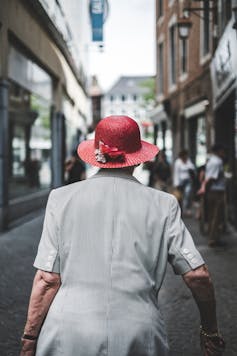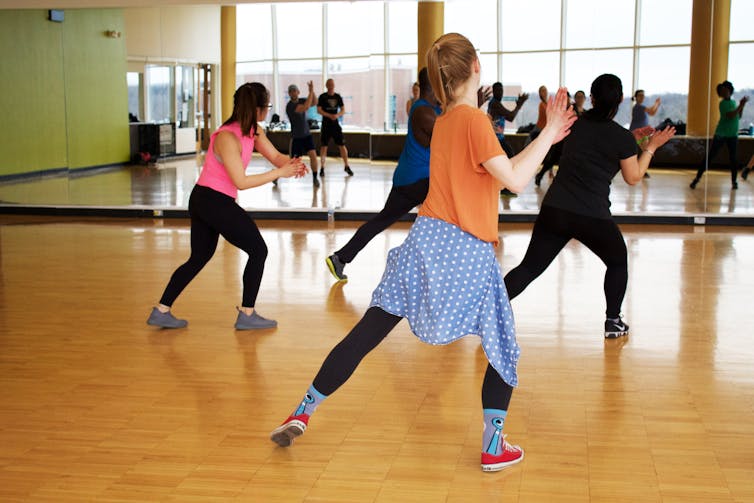One in four Australians are lonely, which affects their physical and mental health
- Written by Michelle H Lim, Senior Lecturer and Clinical Psychologist, Swinburne University of Technology
One in four Australians are lonely, our new report has found, and it’s not just a problem among older Australians – it affects both genders and almost all age groups.
The Australian Loneliness Report, released today by my colleagues and I at the Australian Psychological Society and Swinburne University, found one in two (50.5%) Australians feel lonely for at least one day in a week, while more than one in four (27.6%) feel lonely for three or more days.
Our results come from a survey of 1,678 Australians from across the nation. We used a comprehensive measure of loneliness to assess how it relates to mental health and physical health outcomes.
Read more: Politics with Michelle Grattan: Andrew Giles on the growing issue of loneliness
We found nearly 55% of the population feel they lack companionship at least sometime. Perhaps unsurprisingly, Australians who are married or in a de facto relationship are the least lonely, compared to those who are single, separated or divorced.
While Australians are reasonably connected to their friends and families, they don’t have the same relationships with their neighbours. Almost half of Australians (47%) reported not having neighbours to call on for help, which suggests many of us feel disengaged in our neighbourhoods.
Impact on mental and physical health
Lonely Australians, when compared with their less lonely counterparts, reported higher social anxiety and depression, poorer psychological health and quality of life, and fewer meaningful relationships and social interactions.
Loneliness increases a person’s likelihood of experiencing depression by 15.2% and the likelihood of social anxiety increases by 13.1%. Those who are lonelier also report being more socially anxious during social interactions.
This fits with previous research, including a study of more than 1,000 Americans which found lonelier people reported more severe social anxiety, depression, and paranoia when followed up after three months.
 Older Australians are less socially anxious than younger folks.
Fabio Neo Amato
Older Australians are less socially anxious than younger folks.
Fabio Neo Amato
Interestingly, Australians over 65 were less lonely, less socially anxious, and less depressed than younger Australians.
This is consistent with previous studies that show older people fare better on particular mental health and well-being indicators.
(Though it’s unclear whether this is the case for adults over 75, as few participants in our study were aged in the late 70s and over).
Younger adults, on the other hand, reported significantly more social anxiety than older Australians.
The evidence outlining the negative effects of loneliness on physical health is also growing. Past research has found loneliness increases the likelihood of an earlier death by 26% and has negative consequences on the health of your heart, your sleep, and levels of inflammation.
Read more: Loneliness is a health issue, and needs targeted solutions
Our study adds to this body of research, finding people with higher rates of loneliness are more likely to have more headaches, stomach problems, and physical pain. This is not surprising as loneliness is associated with increased inflammatory responses.
What can we do about it?
Researchers are just beginning to understand the detrimental effects of loneliness on our health, social lives and communities but many people – including service providers – are unaware. There are no guidelines or training for service providers.
So, even caring and highly trained staff at emergency departments may trivialise the needs of lonely people presenting repeatedly and direct them to resources that aren’t right.
Increasing awareness, formalised training, and policies are all steps in the right direction to reduce this poor care.
For some people, simple solutions such as joining shared interest groups (such as book clubs) or shared experienced groups (such as bereavement or carers groups) may help alleviate their loneliness.
But for others, there are more barriers to overcome, such as stigma, discrimination, and poverty.
 Shared interest groups can help some people feel less alone.
Danielle Cerullo
Shared interest groups can help some people feel less alone.
Danielle Cerullo
Many community programs and social services focus on improving well-being and quality of life for lonely people. By tackling loneliness, they may also improve the health of Australians. But without rigorous evaluation of these health outcomes, it’s difficult to determine their impact.
We know predictors of loneliness can include genetics, brain functioning, mental health, physical health, community, work, and social factors. And we know predictors can differ between groups – for example, young versus old.
But we need to better measure and understand these different predictors and how they influence each other over time. Only with Australian data can we predict who is at risk and develop effective solutions.
Read more: The deadly truth about loneliness
There are some things we can do in the meantime.
We need a campaign to end loneliness for all Australians. Campaigns can raise awareness, reduce stigma, and empower not just the lonely person but also those around them.
Loneliness campaigns have been successfully piloted in the United Kingdom and Denmark. These campaigns don’t just raise awareness of loneliness; they also empower lonely and un-lonely people to change their social behaviours.
A great example of action arising from increased awareness comes from the Royal College of General Practitioners, which developed action plans to assist lonely patients presenting in primary care. The college encouraged GPs to tackle loneliness with more than just medicine; it prompted them to ask what matters to the lonely person rather than what is the matter with the lonely person.
Australia lags behind other countries but loneliness is on the agenda. Multiple Australian organisations have come together after identifying a need to generate Australian-specific data, increase advocacy, and develop an awareness campaign. But only significant, sustained government investment and bipartisan support will ensure this promising work results in better outcomes for lonely Australians.
Authors: Michelle H Lim, Senior Lecturer and Clinical Psychologist, Swinburne University of Technology



















